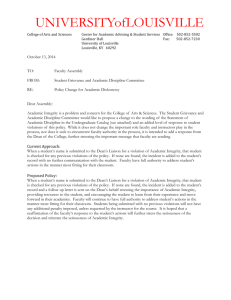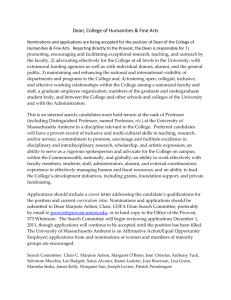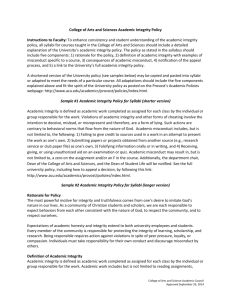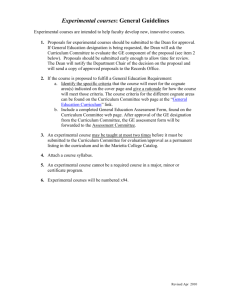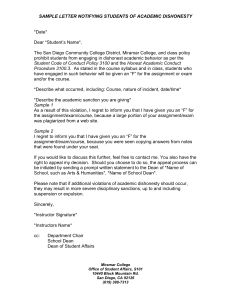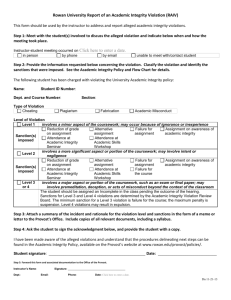Academic Integrity Policy Dakota Wesleyan University is dedicated
advertisement
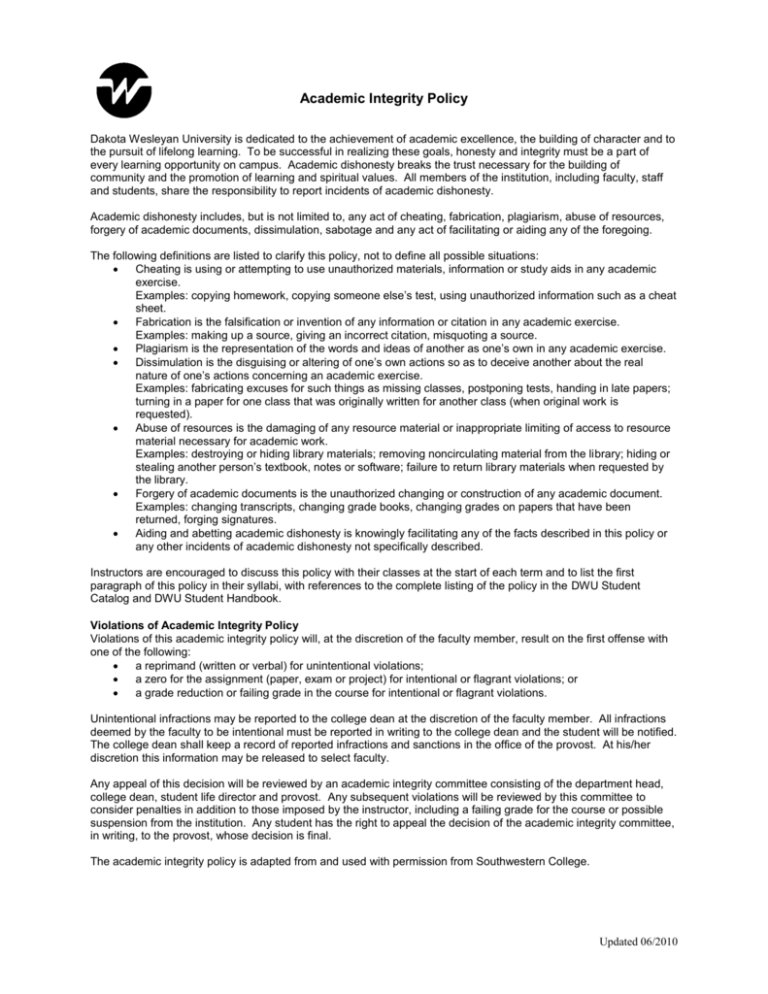
Academic Integrity Policy Dakota Wesleyan University is dedicated to the achievement of academic excellence, the building of character and to the pursuit of lifelong learning. To be successful in realizing these goals, honesty and integrity must be a part of every learning opportunity on campus. Academic dishonesty breaks the trust necessary for the building of community and the promotion of learning and spiritual values. All members of the institution, including faculty, staff and students, share the responsibility to report incidents of academic dishonesty. Academic dishonesty includes, but is not limited to, any act of cheating, fabrication, plagiarism, abuse of resources, forgery of academic documents, dissimulation, sabotage and any act of facilitating or aiding any of the foregoing. The following definitions are listed to clarify this policy, not to define all possible situations: Cheating is using or attempting to use unauthorized materials, information or study aids in any academic exercise. Examples: copying homework, copying someone else’s test, using unauthorized information such as a cheat sheet. Fabrication is the falsification or invention of any information or citation in any academic exercise. Examples: making up a source, giving an incorrect citation, misquoting a source. Plagiarism is the representation of the words and ideas of another as one’s own in any academic exercise. Dissimulation is the disguising or altering of one’s own actions so as to deceive another about the real nature of one’s actions concerning an academic exercise. Examples: fabricating excuses for such things as missing classes, postponing tests, handing in late papers; turning in a paper for one class that was originally written for another class (when original work is requested). Abuse of resources is the damaging of any resource material or inappropriate limiting of access to resource material necessary for academic work. Examples: destroying or hiding library materials; removing noncirculating material from the library; hiding or stealing another person’s textbook, notes or software; failure to return library materials when requested by the library. Forgery of academic documents is the unauthorized changing or construction of any academic document. Examples: changing transcripts, changing grade books, changing grades on papers that have been returned, forging signatures. Aiding and abetting academic dishonesty is knowingly facilitating any of the facts described in this policy or any other incidents of academic dishonesty not specifically described. Instructors are encouraged to discuss this policy with their classes at the start of each term and to list the first paragraph of this policy in their syllabi, with references to the complete listing of the policy in the DWU Student Catalog and DWU Student Handbook. Violations of Academic Integrity Policy Violations of this academic integrity policy will, at the discretion of the faculty member, result on the first offense with one of the following: a reprimand (written or verbal) for unintentional violations; a zero for the assignment (paper, exam or project) for intentional or flagrant violations; or a grade reduction or failing grade in the course for intentional or flagrant violations. Unintentional infractions may be reported to the college dean at the discretion of the faculty member. All infractions deemed by the faculty to be intentional must be reported in writing to the college dean and the student will be notified. The college dean shall keep a record of reported infractions and sanctions in the office of the provost. At his/her discretion this information may be released to select faculty. Any appeal of this decision will be reviewed by an academic integrity committee consisting of the department head, college dean, student life director and provost. Any subsequent violations will be reviewed by this committee to consider penalties in addition to those imposed by the instructor, including a failing grade for the course or possible suspension from the institution. Any student has the right to appeal the decision of the academic integrity committee, in writing, to the provost, whose decision is final. The academic integrity policy is adapted from and used with permission from Southwestern College. Updated 06/2010 Academic Integrity Violation Form Student: Incident Date: Course Number: Course Title: Instructor: Term: Violation: Cheating Fabrication Plagiarism Abuse of Resources Forgery of Academic Aiding and Abetting Academic Dishonesty Records Dissimulation Summary of Violation (attach additional documents as needed): Violations of this academic integrity policy will, at the discretion of the faculty member, result on the first offense with one or a combination of the following: Sanction: Written Reprimand, unintentional violation Verbal Reprimand, unintentional violation Zero for Assignment, intentional or flagrant violation Grade Reduction or Failing Grade in course, intentional or flagrant violation Unintentional infractions may be reported to the college dean at the discretion of the faculty member. All infractions deemed by the faculty to be intentional must be reported in writing to the college dean and the student will be notified. The college dean shall keep a record of reported infractions and sanctions in the office of the provost. At the college dean’s discretion this information may be released to select faculty. Any academic integrity appeal will be reviewed by an academic integrity committee consisting of the department head, college dean, student life director and provost. Any subsequent violations will be reviewed Updated 06/2010 by this committee to consider penalties in addition to those imposed by the instructor, which could include a failing grade for the course or possible suspension from the institution. Any student has the right to appeal the decision of the academic integrity committee, in writing, to the provost, whose decision is final. Student accepted responsibility for the violation and agreed to the sanction. Student accepted responsibility for the violation but did not agree to the sanction. Student did not accept responsibility for the violation nor agree to the sanction. Student’s Signature Date Instructor’s Signature Date Dean’s Signature Date The original form is to be filed in the office of the provost. Updated 06/2010
